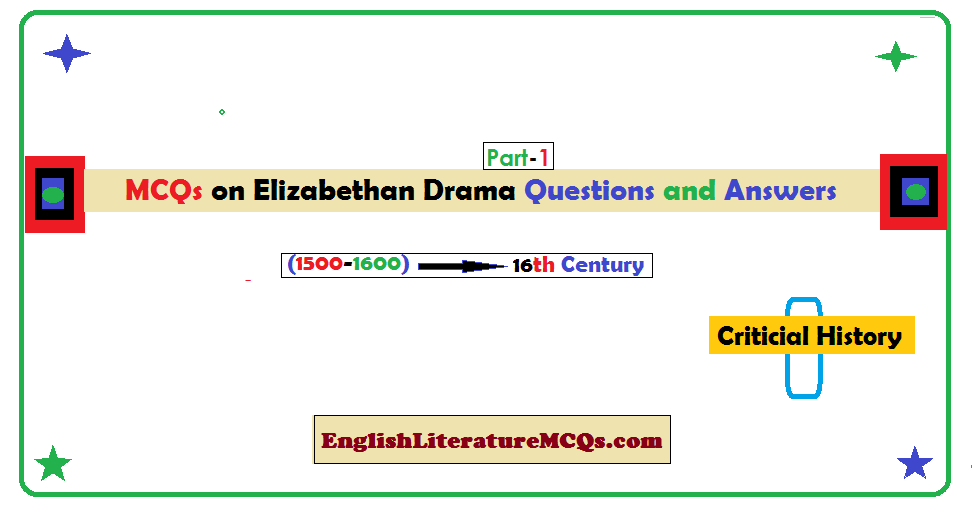Introduction To Puritan Age Poetry (The School Of Spenser)
Table of Contents
The Puritan Poetry, which is also called the Jacobean and Caroline Poetry during the reigns of James-I and Charles-I respectively can be divided into three parts. Here, we will discuss about the part one of Puritan Poetry which is the Poetry of the School of Spenser. The MCQs quiz questions on “Puritan Poetry” Multiple Choice Questions and Answers are published according to the new study syllabus for 2021-22.
Read More: MCQs on Puritan Age (The Age of Milton) - [1600-1660]
These online MCQs test on ” Quiz Puritan Poetry (The School Of Spenser)” contain top interview quiz questions and answers, including the critical history of English Literature from the Beginning to Post Modern & Post Colonial Literature in different posts englishliteraturemcqs.com preferably for the preparation of Jobs, interviews, and other competitive exams including overseas students. In every post of the English Literature MCQs Online Test, we are waiting for your positive feedback.
Puritan Poetry Quiz (The School Of Spenser) [Part-1]
✒ Puritan Poetry Characteristics:
Q1. The Puritan Poetry is also named:
- Jacobean poetry
- Caroline poetry
- Both a and b
Q2. Spenserians were the followers of which literary personality?
- Sidney
- Spenser
- John Lyly
Q3. The most thorough-going disciples of Spenser during the reign of James I were:
- Phineas Fletcher (1582-1648)
- Giles Fletcher (1583-1623)
- Both a and b
Q4. Who wrote a number of Spenserian pastorals and allegories?
- Phineas Fletcher (1582-1648)
- Giles Fletcher (1583-1623)
- Both a and b
Read More: MCQs on Jacobean and Caroline Drama Features and Characteristics 2021
Q5. Phineas Fletcher most ambitious poem which portrays in a minutely detailed allegory the physical and mental constitution of man, the struggle between Temperance and his foes, the will of man and Satan is:
- Triumph in Heaven
- The Purple Island
- Earth over and after Death
Q6. “The Purple Island” poem follows the allegorical pattern of the which Spenser’s poem?
- Faerie Queene
- Astrophel
- Amoretti
Q7. Who was more lyrical and mystical than his brother Phineas Fletcher?
- William Shakespeare
- Giles Fletcher
- George Wither
Q8. Literary work of Giles Fletcher were:
- Christ’s Victorie
- Triumph in Heaven and Earth over and after Death
- Both a and b
Read More: MCQs on Metaphysical Poetry
✒ William Browne, George Wither and William Drummond, the Spenser’s Followers
Q9. Which was the important poetical work of William Browne?
- Britannia’s Pastorals
- Arcadia
- Fidella
Q10. The poem which shows all the characteristics of Elizabethan pastoral poetry is:
- Faerie Queene
- Arcadia
- Britannia’s Pastorals
Q11. Fidella, The Shepherd’s Hunting and Fair Virtue, the Mistress of Philarete were the best-known poems of which literary personality?
- George Peele(1558-1597)
- George Wither(1588-1667)
- Thomas Kyd(1558-1595)
Read More: MCQs on Cavalier Poetry
Q12. Most of George Wither Poetry is:
- an elegy
- blank verse
- pastoral
Q13. In his last years who wrote didactic and satirical verse, which earned for him the title of “our English Juvenal”?
- William Browne(1590-1645)
- George Wither(1588-1667)
- Thomas Kyd(1558-1595
Q14. William Drummond was a ___________________ poet?
- Italic poet
- French poet
- Scottish poet
Read More: MCQs About John Milton Multiple Choice Questions and Answers 2021
Q15. Who wrote a number of pastorals, sonnets, songs, elegies and religious poems?
- William Drummond(1585-1649)
- William Browne(1590-1645)
- George Wither(1588-1667)
Q16. William Drummond well- known poems are:
- Tears on the Death of Maliades (an elegy)
- Sonnets, Flowers of Sion and Pastorals
- Both a and b

